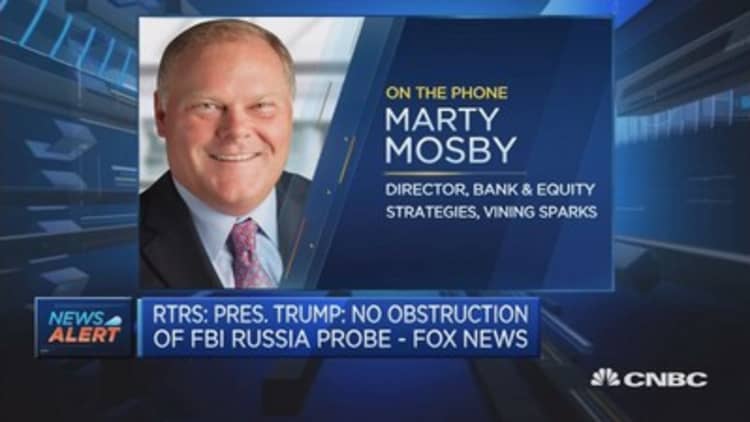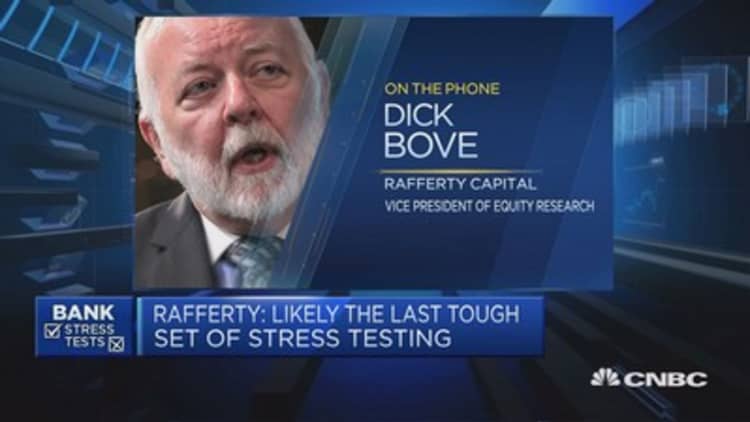
With banks showing they're in perhaps their best health since the financial crisis and ready to return heaps of cash to investors, it would be natural to expect a little more market enthusiasm.
Instead, the sector has stumbled through the year, the luster of its "Trump trade" status wearing thin and even the prospect of higher interest rates doing little to stoke more buyers.
That sets up an interesting scenario this week: The second round of stress test results will be announced Wednesday, the likely result of which will be most or all of the banks involved gaining approval for their plans to return capital to shareholders. The first round of testing found all 34 banks holding capital above the minimum requirements.
At least 10 banks are expected to announce they'll be releasing more than 100 percent of earnings in buybacks and dividends.
And some people aren't very happy about that at all.
"These companies have completely lost their way. ... They have no vision, they have no concept of how to grow these businesses," Dick Bove, vice president of equity research at Rafferty Capital Markets, said in an interview. "They have no idea how to use the capital they've been entrusted with."
Lacking ideas about how to grow their institutions organically, banks are boosting their stock prices by simply shoveling cash back to shareholders. However, even with the prospect of that cash coming back, investors remain cool to bank stocks.
This industry needs new leaders who can shape the visions and implement the strategies to grow.Dick BoveVice president of equity research, Rafferty Capital Markets
The sector is down more than 2 percent over the past week, though it made up some of the losses in Monday trading. For the year, financials are up a bit more than 3 percent, well behind the 's return of around 9 percent and good for the third-worst performer among the index's 11 sectors.
Bove said the banks' leaders are to blame for the weak performance not only in share price but also in overall performance.
"Banks are selling the perfect no-growth strategy — i.e., we have no idea as to how to grow our businesses so we are giving away shareholders money primarily to people who do not want to have anything to do with us," he said in a separate note to clients.
The industry, he added, is piloted by "bank executives [who] may be the most inarticulate group of company leaders in history. ... This industry needs new leaders who can shape the visions and implement the strategies to grow."
Bove wouldn't name names of individuals he thinks have overstayed their welcome.
Caught in the regulatory box
Other industry experts, however, see the problems as reaching beyond the boardroom and into the halls of Congress and the Federal Reserve, both of which put tight reins on banking after the damage done during the financial crisis.
"The Street has turned the [stress test] process into a way of justifying greater cash return, and I'm not sure that's appropriate," said Christopher Whalen, head of Whalen Global Advisors. "But this is the house the Fed has built, so they have to live in it."
Indeed, the Fed is the final judge over the capital proposals. While the central bank has been vocal in terms of its desire to make sure banks are safe, the thinking is that most if not all the tested institutions will get the OK this time around.
Former FDIC Chair Sheila Bair worries about the Fed's willingness to approve the capital plans. In a post for American Banker, Bair said she "would advise extreme caution for payouts in excess of earnings," reasoning that for some banks the capital returns might not leave enough left over should a crisis hit.
Still, Keefe, Bruyette & Woods estimates 11 banks will get approval to dispense more than 100 percent of profits — a significant landmark for the businesses to begin dipping into their cash stockpiles. Banks have $2.11 trillion stored at the Fed in excess reserves alone, a number that is just shy of $2 trillion more than required.
The big cash return "is the upside to the view by many investors that banking is becoming a utility!" KBW analyst Fred Cannon said in a note.
"In our view the best strategy for most banks is to establish a sustainable regular dividend that can be increased over time and a share repurchase program that returns capital in excess of investment opportunities and dividends to shareholders," Cannon added.
As long as banking is treated as a utility — Bove contends the industry has been effectively nationalized — the hopes for organic growth may go unfilled, at least for the largest institutions.
"I think it is very limited. M&A is the only way you can show top-line growth, but the deals aren't obvious," Whalen said. "The curse of regulation is that you can''t innovate. None of these big banks or big financials generally can really be that flexible in how they run their businesses, because they have this top-down template from the regulators. They are forced to run their businesses to suit the regulatory environment."
Watch: Dick Bove gives his advice on which banks to buy after the stress tests.



